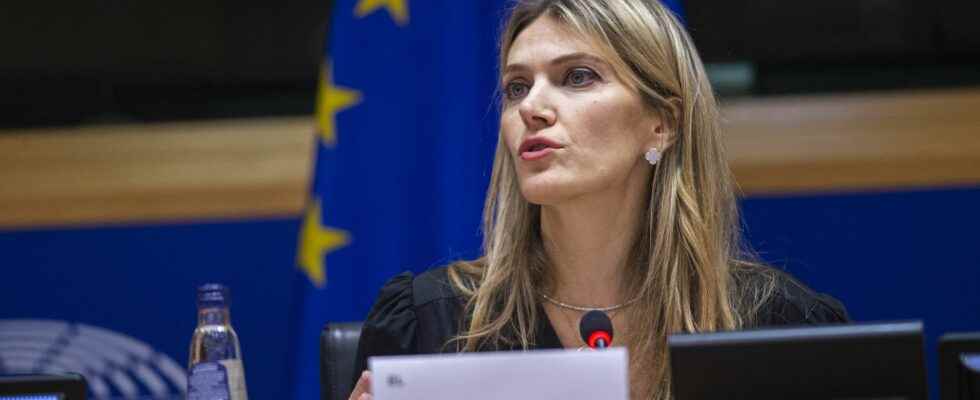In politics as on a football field, you have to know how to keep your distance, and avoid too much contact, at the risk of being sanctioned. Vice-President of the European Parliament Eva Kaili seems to have learned this the hard way, the evening of the first quarter-finals of the World Cup. This Friday, while Argentina and Croatia were playing their semi-final in the emirate, the Belgian police arrested the influential European elected official at her Brussels home, on suspicion of corruption, for the benefit of Qatar.
The MEP, whose political career began in the Greek Parliament in 2007, would have accepted money from the peninsula, already in the sights of several anti-corruption institutions, for the conditions of attribution of the sports competition. In exchange, Qatar would have asked the elected official for help to influence the “economic and political decisions of the European Parliament”, indicates the prosecution. Eva Kaili, as well as three other people, were placed in detention at the end of their police custody, this Sunday. For its part, Qatar denies.
At the home of the elected, former television presenter of a large private channel, Social Democrat (S&D) MEP since 2014, the police found bags filled with banknotes. The father of the person concerned was also arrested, encumbered with an overflowing quantity of cash. A form of “flagrante delicto” which allowed Belgian justice to override the parliamentary immunity which until now protected the main suspect. The affair could turn out to be one of the most “dramatic” of recent years, said European Commissioner for the Economy Paolo Gentiloni.
A suitcase of cash
What would Qatar have had to gain if it turned out that such an agreement had indeed been concluded? “The emirate has raised its international ambitions and is looking to improve its reputation, the World Cup is just one of the means employed. While the European Parliament does not have a diplomatic mandate as such, it can pronounce resolutions certainly symbolic but important in terms of image. Above all, it can sanction, by suspending customs or cooperation agreements, for example”, underlines Olivier Costa, research director at the CNRS, specialist in the European Parliament.
Immediately suspended from her prerogatives by the President of Parliament, Eva Kaili was notably responsible for relations with the Middle East. In this context, she went to Qatar in mid-November to meet the Qatari Minister of Labor Ali bin Samikh Al Marri. He was also invited by a parliamentary subcommitteeon November 11, to discuss the situation of foreign workers in the emirate, while “thousands died on construction sites (…) in anticipation of the World Cup”.
A Qatar “leader in labor rights”, according to Kaili
These exchanges culminated in a vote on whether Parliament should produce a resolution on Qatar. At the podium, on November 22, Eva Kaili was then indignant at having been “the only one to say that Qatar is a leader in terms of labor rights”, and then accused European elected officials of launching “intimidation and calls for discrimination” against Qataris and their partners. A position very far from the consensus around the shortcomings of Doha upstream of the world, largely in the majority in European circles.
Even before the case came to light, the statements of the vice-president, a now hated member of the Greek socialist party, were considered particularly lenient with regard to the peninsula. Especially since they overlap with the regime’s line of defense. “Qatar was surprisingly described as exemplary, the victim of harassment. The implication was that the country was the victim of a form of Western racism”, relates Olivier Costa. Since the arrest, MEPs on all sides have continued to relay this position, seeing it as a marker of guilt.
In reality, Eva Kaili was not the only one to be so complacent with the peninsula. Many S&D elected officials voted against a resolution reminding Doha of human rights. Qatar, which is also the subject of an investigation for corruption, in France, in connection with Nicolas Sarkozy, could it have been in close contact with other European elected officials? “In Brussels, the emirate is reputed to be particularly inclined to distribute restaurant invitations and gifts, and the rules are still very vague on the question of donations and remuneration from abroad”, regrets Olivier Costa, author of a study on transparency in Parliament.
Who else could have been interested in these mysterious suitcases filled with cash? Eva Kaili, whose title of vice-president could be undone by a vote of Parliament, is not the only politician under suspicion. On Friday, four men were arrested in the morning, including Eva Kaili’s companion, Francesco Giorgi, who is himself a parliamentary assistant, as well as an NGO director, the Italian trade union leader Luca Visentini and the former MEP Pier-Antonio Panzeri who sat from 2004 to 2019. The home of another socialist MEP, the Belgian Marc Tarabella was also searched on Saturday evening. A total of 16 searches were carried out.
